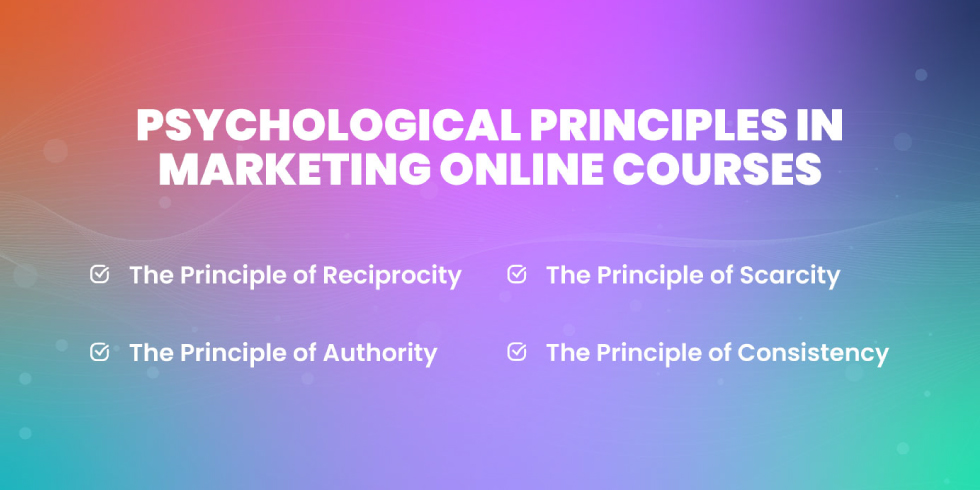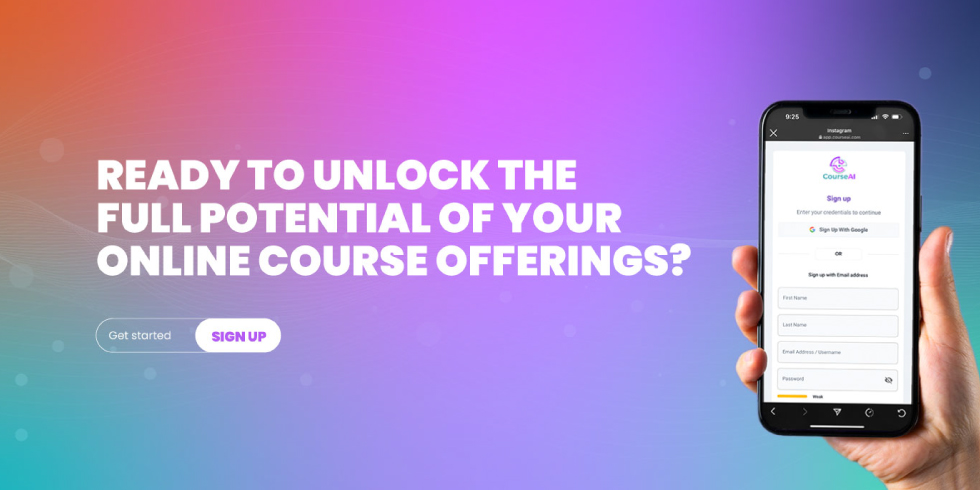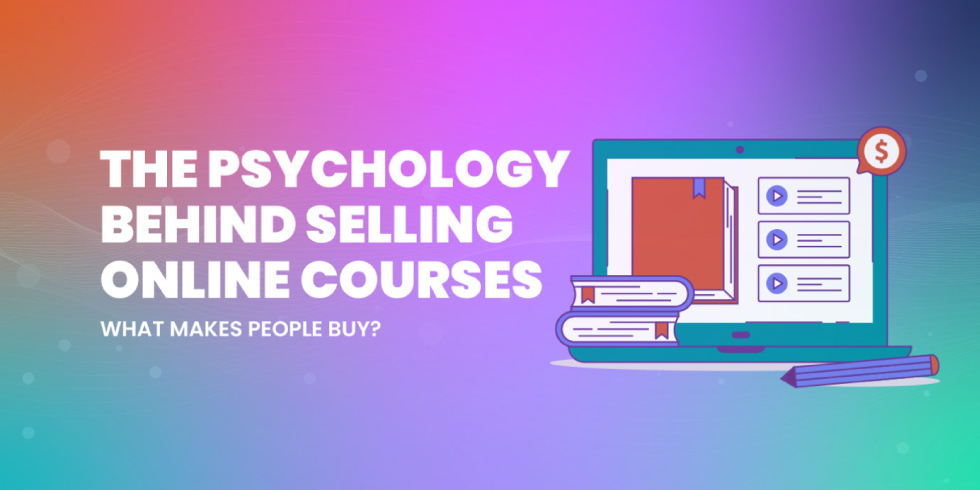Want to learn a magic trick? Understanding the psychology behind customer decisions is crucial in effectively selling online courses.
The motivations and behaviors that drive learners to enroll in online courses vary, influenced by factors such as personal development, career advancement, and the pursuit of knowledge. By analyzing these factors and implementing targeted strategies, AI content creator platforms like CourseAI can optimize your content offerings and increase enrollments.
This article delves into the psychological triggers that influence the purchase of online courses and how CourseAI leverages this understanding to enhance sales.
Identifying the Motivations Behind Purchasing Online Courses
Listen up, this is important: The decision to buy an online course is often influenced by a combination of intrinsic and extrinsic motivations. Understanding these can help educators and course creators design more appealing and effective courses.
The following are the primary motivations behind why people purchase and subscribe to online courses:
- Professional Advancement
- Personal Development
- Social Influence
- Accessibility and Flexibility
Professional Advancement
Many learners pursue online courses to acquire new skills or certifications that can elevate their professional status. This motivation is driven by the desire for career growth, higher earnings, and job security.
| Situation | Benefit |
|---|---|
| Career transition to project coordinator | Acquiring project management certification to qualify for a new position. |
| Seeking a managerial position | Taking a leadership course to gain necessary skills for promotion. |
| Aiming for a salary increase | Completing an advanced course in data analytics for higher earnings. |
Personal Development
Apart from professional growth, personal interest and self-improvement are significant motivators. Learners often choose courses that cater to their hobbies, interests, or personal goals.
| Interest | Goal |
|---|---|
| Photography as a hobby | Improving skills through an advanced photography course. |
| Enhancing physical and mental health | Deepening yoga practice by becoming a certified instructor. |
| Learning to cook healthier meals | Gaining cooking skills through an online culinary course. |
Social Influence
Social proof, such as testimonials and reviews, plays a crucial role in the decision-making process. Potential students are more likely to enroll in a course if they see positive feedback from peers who have achieved tangible benefits.
| Source of Influence | Result |
|---|---|
| Positive peer reviews on LinkedIn | Enrollment in a digital marketing course to enhance skills. |
| Testimonial from a successful startup founder | Signing up for an entrepreneurship course to start a business. |
| Friends’ project successes on social media | Joining a coding bootcamp to achieve similar success. |
Accessibility and Flexibility
The ability to learn at one’s own pace and the convenience of accessing course materials from anywhere are significant advantages of online learning.
| Need | Solution |
|---|---|
| Balancing work and family life | Enrolling in a self-paced online master’s program. |
| Living in a rural area without local educational resources | Accessing a business course online. |
| Preference for diverse learning resources | Using online learning for access to videos, podcasts, and quizzes. |
Learn about CourseAI’s budget-friendly pricing for the best AI content creator platforms out there!
Psychological Principles in Marketing Online Courses

Okay, ready to dive deeper?
Understanding and applying psychological principles in marketing can significantly enhance the effectiveness of promoting online courses. Here’s an expanded look at some key principles:
The Principle of Reciprocity
The principle of reciprocity suggests that when someone receives a favor, they feel an internal pressure to return it. This can be effectively utilized in marketing online courses by offering potential students something of value upfront.
Examples:
- Free Trial Classes: Offer a free lesson or module to potential students, which may encourage them to enroll in the full course as a form of returning the favor.
- Free Resources: Provide free e-books, study materials, or access to exclusive webinars related to the course content, enticing recipients to reciprocate by signing up for more courses.
Try the world’s best AI content creator CourseAI for free!
The Principle of Scarcity
People tend to desire things more if they perceive them as scarce or in limited supply. This principle can be used to create a sense of urgency around enrolling in online courses.
Examples:
- Limited Time Offers: Promote a discount on course fees that is only available for a short period, prompting quick decision-making.
- Exclusive Membership: Offer limited spots for a “premium” version of the course, which includes additional resources or personalized coaching, making the offer more desirable due to its limited nature.
The Principle of Authority
Establishing authority helps to build trust and credibility, which can significantly influence someone’s decision to purchase an online course. Demonstrating that an instructor is an expert in their field can make the course more appealing.
Examples:
- Expert Instructors: Highlight the qualifications and achievements of course instructors in marketing materials.
- Case Studies and Testimonials: Use testimonials and case studies from recognized industry leaders who endorse the course or have benefited from it, reinforcing the course’s credibility.
The Principle of Consistency
The principle of consistency states that once people commit to something, whether verbally or in writing, they are more likely to follow through with it. This can be leveraged by getting potential customers to make small, initial commitments.
Examples:
- Free Sign-ups for More Information: Encourage users to sign up for more information or to join a mailing list, which can lead to them feeling more committed to eventually purchasing the course.
- Interactive Quizzes: Include interactive elements like quizzes that relate to the course topic. Participants who engage with these elements may feel more committed to continuing their learning journey by signing up for the full course.
These strategies, grounded in psychological principles, can help tailor marketing efforts to align with human behavior, increasing both enrollment and engagement in online courses.
Applying Psychological Marketing Principles Using CourseAI
| Psychological Principle | Application with CourseAI |
|---|---|
| Reciprocity | CourseAI enables the generation of free trial classes and resources, which can be offered to potential students. This initial free offering can make potential students more likely to reciprocate by enrolling in the full course. |
| Scarcity | This one-of-a-kind AI content creator platform supports creating limited-time offers and exclusive memberships, utilizing its email copy generation feature to effectively communicate these limited offers to target audiences. |
| Authority | CourseAI assists in establishing authority by generating high-quality content, including detailed course descriptions and expert-designed course outlines. This helps build credibility and trust among potential students. |
| Consistency | By using CourseAI’s tools to engage students through interactive quizzes and personalized course materials, students are more likely to commit to and complete courses. The principle of consistency is supported through regular interaction and personalized learning experiences. |
Conclusion

The psychology behind selling online courses is complex, encompassing various motivational and behavioral factors that influence consumer decisions. By understanding these psychological triggers, you can tailor their marketing strategies and course offerings to meet the specific needs and desires of potential learners.
Ready to unlock the full potential of your online course offerings? Dive into the world of psychological marketing and explore CourseAI’s innovative features today!

